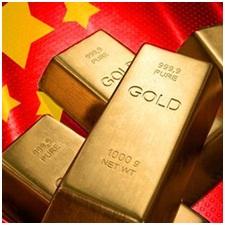China’s recent stock market gyrations have some analysts now calling China the biggest bubble in history. But those who write off China because of market volatility are missing a more important long-term trend of Chinese geopolitical and monetary ascendancy. That trend shows no signs of abating.
China’s leaders have a clever strategy, and Western financial powers may someday wake up in shock when they realize what has occurred.
It’s true that the Chinese government has helped fuel artificial demand for property and equities. China skeptics who argue that these artificially inflated markets will crash to much lower levels could well prove to be correct. Some China doubters also argue that a downturn in China’s economy will put downward pressure on commodity prices.
Commodities – from crude oil to copper to gold and silver – have already suffered a severe cyclical downturn. Commodity markets tend to be leading indicators, moving in advance of whatever economic story of the day the financial media are telling.
But single-day drawdowns of more than 8% in the Chinese stock market this summer certainly caused some forced liquidations of precious metals positions.
The very fact that booms and busts in China’s markets and economy can now exert heavy influence in globally traded markets such as commodities proves the point that China’s influence isn’t on the wane. Not by a long shot. Even if China’s double-digit rates of growth in the early 2000s prove fleeting and never return, China’s economy still remains on track to eclipse the U.S. economy in the years ahead as the world’s largest.
China, Russia Are Quietly Emerging as World’s Gold Buyers
Chinese officials aim to ultimately to challenge the America’s standing as the world’s superpower. That’s why they’re forming a strategic alliance with Russia, an adversary of the U.S. That’s why both the Russian and Chinese central banks have quietly emerged as the world’s largest gold buyers.
In July, the People’s Bank of China reported that it has added more than 600 tons of gold bullion to its stockpiles since 2009, taking the total to 1,658 tons. That represents a 60% jump in gold assets in just six years.
In fact, all of that new metal was added to central bank’s ledger in June 2015.
With gold prices down in June, there's no way the actual buying had occurred then. It appears central bank officials simply moved that metal over from the books of China's state-owned banks, which can hold metal secretly.
So that’s just what the Chinese are reporting officially.
Unofficially, according to MarketWatch columnist David Marsh, “China probably has a lot more gold than it admits.” That’s because the Chinese government regularly acquires gold directly from China’s mining industry.
The transactions are settled in yuan rather than dollars, so most or all of these “internal” gold purchases can avoid showing up as foreign reserve assets.
In examining gold flows into China as well as Chinese gold production, some experts believe that China actually holds more than 10,000 tons of gold, not the “paltry” 1,658 tons the People’s Bank of China is disclosing.
China Has an Incentive to Understate Its Gold Hoard
It makes logical sense that China would understate its gold aspirations. If you had the means to acquire hundreds, or even thousands, of tons of gold, you’d want to do so as stealthily as possible in order to avoid tipping off the market.
If your strategic objective was to dramatically boost gold reserves over a period of several years, you wouldn’t want to see the price rise – at least not while you’re still accumulating. And if you had no ethical qualms about interfering in the market, you’d want to rig prices lower so you could obtain more ounces.
Chinese officials are more than willing to manipulate markets, whether through subterfuge, deceit, or outright force. Recently, in an effort to prop up the stock market, they tried to forbid people from selling shares of stocks. How heavily involved China is in managing the gold market is impossible for an outsider to know.
But there is plenty of evidence to suggest that China is covertly buying gold while dumping U.S. Treasuries. JP Morgan analyst NikolaosPanigirtzoglou calculated that China’s foreign exchange assets got depleted by $520 billion over the past five quarters. Most of that $520 billion in paper asset dumping comes, presumably, from China’s massive holdings of Treasury securities.
China Wants Admission to the Global SDR Club
If China continues to unload U.S. bonds at a feverish pace, the Federal Reserve might be forced to launch a new bond-buying campaign. That, in turn, would diminish the credibility of the U.S. dollar as China seeks inclusion of its yuan into the International Monetary Fund's Special Drawing Rights (SDR) currency basket.
As Reuters reported, China “is pushing for the increased use of the yuan for trade and investment as part of a long-term strategic goal to reduce dependence on the dollar.” The yuan’s ascendancy to the status of a top-tier SDR currency would go a long way toward making the Chinese currency a serious global competitor to the U.S. dollar.
However, if it were known that China actually had 10,000+ tons of gold on hand, other countries would more likely balk at China’s pending petition to join the International Monetary Fund’s exclusive SDR club. (A decision is expected this fall.)
China’s gold-accumulation strategy will go a long way toward making China more independent of the dollar and other fiat currencies.
If you actually believe what the People’s Bank of China reports as its gold reserves, then it has a long way to go to catch up with other countries. While China’s official stash is the world’s sixth largest in absolute terms, it ranks much lower in relation to its economy and its total foreign reserves.
China’s admitted gold hoard represents just 1.6% of its foreign exchange holdings. By comparison, Russia’s gold bullion accounts for 13.4% of reserves.
Whether it owns 1,658 tons or upwards of 10,000 tons, China’s appetite for gold is far from being satisfied. The Chinese government will continue to buy, both officially and unofficially.
China may never establish a model sound money system; nor is that its goal. China simply appreciates the universality of gold. And, as the saying goes, “gold goes where it’s most appreciated.”
Whether you’re a Communist or a capitalist, whether you speak Mandarin or English, gold remains the one permanent, immutable common denominator. Gold’s value has been recognized universally for hundreds of years and will continue to be recognized universally regardless of whatever market gyrations or economic or political strife the future may bring.
Money Metals Exchange and its staff do not act as personal investment advisors for any specific individual. Nor do we advocate the purchase or sale of any regulated security listed on any exchange for any specific individual. Readers and customers should be aware that, although our track record is excellent, investment markets have inherent risks and there can be no guarantee of future profits. Likewise, our past performance does not assure the same future. You are responsible for your investment decisions, and they should be made in consultation with your own advisors. By purchasing through Money Metals, you understand our company not responsible for any losses caused by your investment decisions, nor do we have any claim to any market gains you may enjoy. This Website is provided “as is,” and Money Metals disclaims all warranties (express or implied) and any and all responsibility or liability for the accuracy, legality, reliability, or availability of any content on the Website.
Recommended Content
Editors’ Picks
EUR/USD clings to gains above 1.0750 after US data

EUR/USD manages to hold in positive territory above 1.0750 despite retreating from the fresh multi-week high it set above 1.0800 earlier in the day. The US Dollar struggles to find demand following the weaker-than-expected NFP data.
GBP/USD declines below 1.2550 following NFP-inspired upsurge

GBP/USD struggles to preserve its bullish momentum and trades below 1.2550 in the American session. Earlier in the day, the disappointing April jobs report from the US triggered a USD selloff and allowed the pair to reach multi-week highs above 1.2600.
Gold struggles to hold above $2,300 despite falling US yields

Gold stays on the back foot below $2,300 in the American session on Friday. The benchmark 10-year US Treasury bond yield stays in negative territory below 4.6% after weak US data but the improving risk mood doesn't allow XAU/USD to gain traction.
Bitcoin Weekly Forecast: Should you buy BTC here? Premium

Bitcoin (BTC) price shows signs of a potential reversal but lacks confirmation, which has divided the investor community into two – those who are buying the dips and those who are expecting a further correction.
Week ahead – BoE and RBA decisions headline a calm week

Bank of England meets on Thursday, unlikely to signal rate cuts. Reserve Bank of Australia could maintain a higher-for-longer stance. Elsewhere, Bank of Japan releases summary of opinions.


